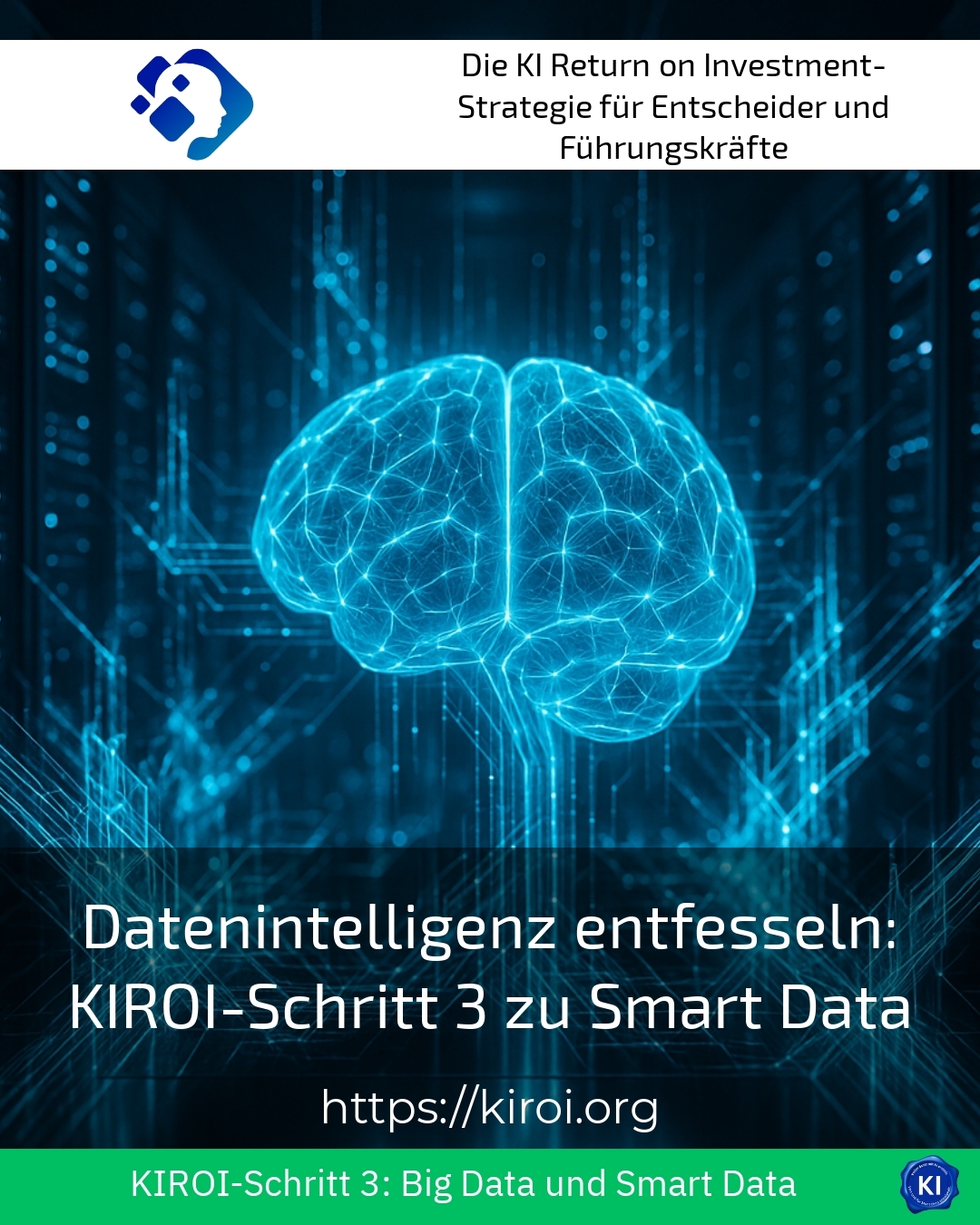Unleashing data intelligence means structuring the enormous wealth of available data in a targeted manner and utilising it intelligently. A systematic approach such as the KIROI model supports companies in gaining valuable insights from raw data. The third phase of this model focuses on using smart data not only to reduce data volumes, but also to create precise, usable information for decision-making and innovation. In this way, data intelligence opens up new perspectives for increasing efficiency and competitive advantages.
KIROI step 3: From big data to smart data through data intelligence
In the third step of the KIROI approach, the focus is on converting large amounts of data into specific, usable insights. Data intelligence helps to generate this smart data, i.e. precisely the information that supports decision-making processes and optimises operational workflows. Standardised data processing combined with intelligent analysis models reduces complexity and ensures the ability to act on the basis of reliable facts.
Traditional challenges, such as being overwhelmed by floods of data, can thus be overcome. Instead, users receive precise insights at the right time - be it for predictive maintenance in industry, demand forecasting in retail or workforce scheduling in healthcare.
Data intelligence makes it possible to recognise patterns that would otherwise remain hidden. This enables companies to respond to market changes in a more targeted manner and utilise their resources more efficiently.
Practical examples from different industries
In the financial sector, data intelligence enables risks to be assessed and fraud to be recognised at an early stage. Banks use smart data, for example, to assess creditworthiness more accurately and create personalised offers.
In the field of logistics, data-intelligent systems help to optimise routes and shorten delivery times. This reduces costs and increases customer satisfaction by making transport processes more transparent and easier to plan.
In the healthcare sector, treatment processes can be made more efficient through data intelligence. Clinics link patient data with medical studies in order to make targeted treatment decisions and utilise resources in a targeted manner.
BEST PRACTICE with one customer (name hidden due to NDA contract) An international manufacturer of industrial plants implemented data-intelligent methods for analysing machine data. This enabled predictive maintenance, which significantly reduced production downtime and minimised costs at the same time. This enabled the company to develop new business models and sustainably increase the efficiency of its operational processes.
How data intelligence strengthens decision-making processes
Data intelligence transforms decision-making processes: Instead of intuitive assumptions, these are now based on sound, up-to-date information. Data analysed in real time enables managers to better assess risks and react dynamically to market changes. This creates competitive advantages through faster responsiveness and targeted measures.
Retailers who analyse customer data intelligently can carry out targeted marketing campaigns. This improves customer loyalty and increases sales because offers are tailored precisely to customer needs. Personalised product recommendations are also examples of how data intelligence improves the customer journey.
In the energy sector, analysing consumption data makes it possible to forecast energy requirements more precisely. Companies can manage their grids more efficiently, which leads to a reduction in outages and improved sustainability.
Specific tips for the implementation of smart data projects
A successful introduction to the topic of data intelligence requires a clean database. This means that data must be recorded in a structured manner and duplicate or inconsistent entries must be removed. This creates the basis for clear and reliable analyses.
Companies should also invest in modern analysis tools that make it easier to filter and visualise data. This makes it possible to reduce complexity and recognise relevant findings more quickly.
Last but not least, it makes sense to train employees in the use of data-intelligent systems. Smart data can only be utilised optimally in everyday life if the team has data expertise.
My analysis
Data intelligence is a key element in deriving real benefits from the growing volume of information. KIROI Step 3 provides a practical demonstration of how big data can be transformed into valuable smart data through intelligent processing. Companies benefit from faster, more informed decisions and optimised processes. The examples from a wide range of industries illustrate that data intelligence already offers numerous opportunities to initiate innovations and secure competitive advantages.
Further links from the text above:
[1] What is data intelligence and what does it mean?
[2] What is data intelligence?
[3] Success factor for decision-makers in the big & smart data age
[6] Unleashing data intelligence: Big Data & Smart Data for ...
[7] Why data intelligence is the key to your business success
[9] What is Data Intelligence? Advantages, application & best ...
[11] Data intelligence or the art of turning data into gold ...
For more information and if you have any questions, please contact Contact us or read more blog posts on the topic Artificial intelligence here.















